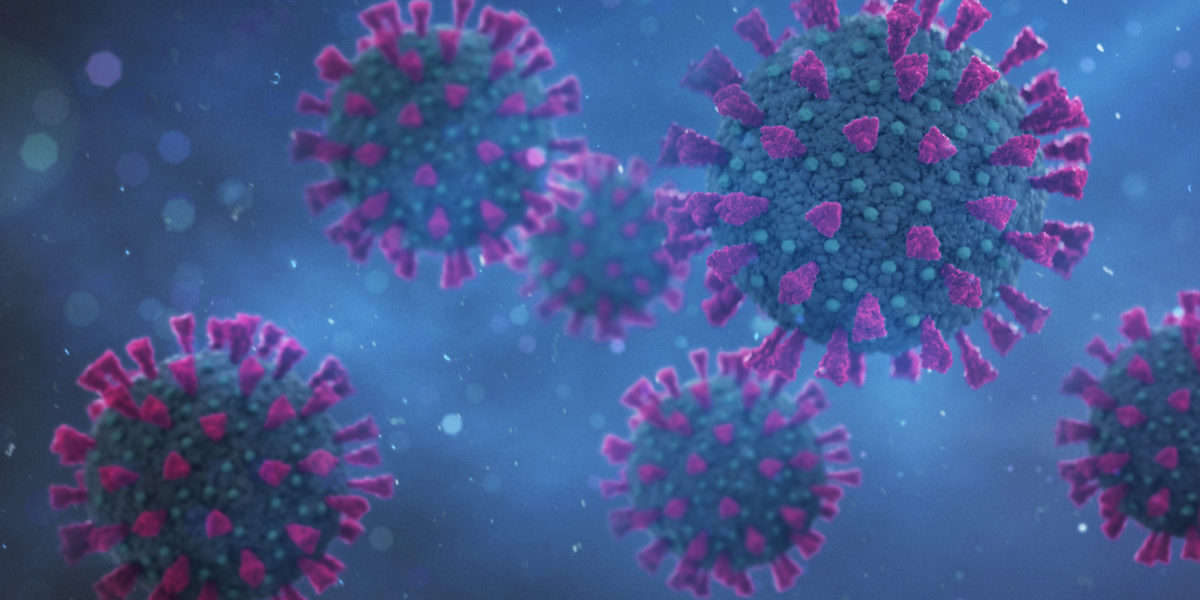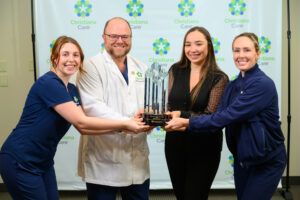To meet the unprecedented demand for hospital and health care services amid the current surge of COVID-19, ChristianaCare has implemented Crisis Standards of Care.
Crisis Standards of Care are used in times of emergency to guide decision-making when the demand for care surpasses the available resources, and contingency strategies designed to maintain conventional processes of care have been exhausted.
“At ChristianaCare, we take care of people. Our commitment to our community is unwavering.”
—Janice Nevin, M.D., MPH
They provide a framework in which health care providers can modify processes or change the way resources are allocated in order to care for patients with the highest need in conditions when it is no longer possible to deliver care according to normal standards. Amid the current COVID-19 surge, many health systems across the country have adopted these standards.
Health systems across the United States are increasingly finding it necessary to implement Crisis Standards of Care as the current surge of COVID-19 stretches the health care system beyond its capacity.
“At ChristianaCare, we take care of people. Our commitment to our community is unwavering,” said Janice Nevin, M.D., MPH, president and CEO.
“The health care system is under unprecedented strain. Never have there been this many people in our community who need hospitalization, emergency care and other health care services.
“We have taken this step to implement Crisis Standards of Care so that our caregivers have the flexibility and decision-making tools they need in order to deliver care to patients with the highest need at this time when the demand exceeds all available resources.”
“While an individual can get COVID and suffer mild-to-moderate symptoms and be OK, there are still many, many people who are becoming seriously ill and dying from this disease.”
—Ken Silverstein, M.D., MBA
Crisis conditions exist when resource challenges, including staffing, space and supplies, place such a burden on the health system that it must modify the practice standards in order to provide care.
Crisis Standards of Care enable greater flexibility for health care providers in decision-making in areas such as:
• Advancing different care models.
• Simplifying documentation requirements.
• Changing workflows.
• Changing admission or discharge criteria.
• Modifying surgical and other procedural and diagnostic schedules.
• Adjusting how supplies are allocated.
• Changing how treatment resources are distributed.
• Redeploying clinical and non-clinical staff.
• Adjusting staffing standards including, among other things, staffing ratios, return to work, annual educational requirements or credentialling requirements.
• Limiting availability of non-urgent services.
• Adapting documentation, reporting and approach to regulatory requirements.
Decisions regarding the use of limited resources will be made in a just, equitable and transparent way, and our caregivers will engage with patients and their family members about expectations and options of care.
ChristianaCare will rely upon guidelines adopted by the National Academy of Medicine and the Delaware Division of Public Health in its Crisis Standards of Care Concept of Operations Plan, and also guidelines under consideration in Maryland.
An unvaccinated American is 14 times more likely to die from Covid-related complications than a fully vaccinated person.
This goes up to 20 times more likely when compared with someone who has received a booster vaccination.
Click here to find a COVID-19 vaccine or booster site near you.
“Over the past two years, we have learned and adapted at every step throughout this pandemic,” said Ken L. Silverstein, M.D., MBA, chief physician executive.
“Through this time, we have deployed surge plans and taken many steps to stave off the need to implement Crisis Standards of Care. But the time has come when there just are not enough resources available to meet the growing demand.
“This is a pivotal moment when everyone needs to recognize the seriousness of the situation our community and our health system is in.”
Unprecedented Demand Driven by COVID-19
While the demand for health care includes patients with and patients without COVID-19, the high rate of COVID spread in the community is the single most important cause of this current crisis.
“We urgently need the community to help us. We need everyone to get vaccinated, get their booster when eligible, and continue to practice the safety steps we know are effective—masking, social distancing and hand-washing.”
—Ken Silverstein, M.D., MBA
For weeks, ChristianaCare has been operating at over 100 percent of capacity in its hospitals, emergency departments, urgent care centers and practices. Approximately 40 percent of all patients at Christiana Hospital, Wilmington Hospital and Union Hospital are COVID-positive. The vast majority of these COVID-19 patients are symptomatic and were admitted because of COVID or require a higher level of care because of the impact of COVID on their health.
Additionally, as community spread has surged to record numbers, and as the highly contagious omicron variant has become the dominant variant, breakthrough cases among vaccinated people are becoming more common.
Dr. Silverstein urges the community to understand that the significant number of unvaccinated people continues to be the primary driver of this very serious situation.
“We need everyone to understand that while an individual can get COVID and feel bad for a few days or suffer mild-to-moderate symptoms and be OK, there are still many, many people who are becoming seriously ill and dying from this disease,” Dr. Silverstein said.
According to national data, an unvaccinated American is 14 times more likely to die from COVID-related complications than a fully vaccinated person. This goes up to 20 times more likely when compared with someone who has received a booster vaccination. These data align with what caregivers are seeing on the front lines of care at ChristianaCare, as families continue to lose loved ones and health care workers struggle to save lives under crisis conditions.
“This is not sustainable,” he said. “We urgently need the community to help us. We need everyone to get vaccinated, get their booster dose when eligible, and continue to practice the safety steps that we know are effective in reducing the spread of COVID—masking, social distancing and hand-washing—even in places where guidelines aren’t posted or masking isn’t required.”
What Can the Community Do to Help?
• Everyone age 5 and older should get vaccinated for COVID-19.
• Everyone age 12 and older should get a booster dose when they are eligible.
• Practice COVID-19 safety: Wear a mask, avoid gathering indoors, practice social distancing and wash hands frequently. It’s important to follow these steps even in places where safety guidelines are relaxed or where safety instructions aren’t posted.
• Do not go to the emergency room unless you are experiencing a medical emergency.
• If you’re sick, assume it’s COVID-19, and stay home except to get a COVID test. Most people with COVID-19 have mild illness and can recover at home without medical care. Get rest and stay hydrated. Take over-the-counter medicines, such as acetaminophen, to help you feel better. Call your doctor if your symptoms are severe or worsening. Get care or call 911 if you have trouble breathing or have any other emergency warning signs, or if you think it is an emergency.
• Do not go to the emergency room for a COVID test. Find test availability in Delaware, the Maryland, New Jersey and Pennsylvania.
• Patients with serious illness and injury should continue to access needed care at our hospitals and emergency departments. Those with less serious conditions should avoid the emergency departments and seek care from their primary care provider or one of our many urgent care centers. Patients can expect longer wait times for all services and limitations on visitors.



